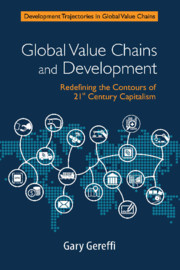Book contents
- Frontmatter
- Dedication
- Contents
- List of Tables
- List of Figures and Boxes
- Foreword
- Acknowledgments
- Sources
- 1 The Emergence of Global Value Chains: Ideas, Institutions, and Research Communities
- Part I Foundations of the Global Value Chain Framework
- Part II Expanding the Governance and Upgrading Dimensions in Global Value Chains
- Part III Policy Issues and Challenges
- Co-authors
- Index
1 - The Emergence of Global Value Chains: Ideas, Institutions, and Research Communities
Published online by Cambridge University Press: 09 November 2018
- Frontmatter
- Dedication
- Contents
- List of Tables
- List of Figures and Boxes
- Foreword
- Acknowledgments
- Sources
- 1 The Emergence of Global Value Chains: Ideas, Institutions, and Research Communities
- Part I Foundations of the Global Value Chain Framework
- Part II Expanding the Governance and Upgrading Dimensions in Global Value Chains
- Part III Policy Issues and Challenges
- Co-authors
- Index
Summary
The chapters in this book were written during the past 25 years and the ideas in them evolved over a considerably longer period. This era spans dramatic changes in the global economy: the forging of the US-led Bretton Woods system to rebuild the postwar international economy in the 1950s and 1960s; the rise of offshore outsourcing and far-flung global supply chains in the 1970s and 1980s; the dismantling of the Soviet Union and the emergence of the BRICs1 in the 1990s; the surge of China as an export power following its admission to the World Trade Organization (WTO) in 2001; the wrenching disruptions of the global recession of 2008–2009; the waning influence of the ‘Washington Consensus’ policy regime; and the surprising turn in the mid-2010s to a virulent economic nationalism and xenophobic populism in the United States and Europe that reject many of the principles of the post-World War II Pax Americana (Buruma, 2016). How can we make sense of such fundamental transformations in global capitalism? What are the determinants of this reorganization of the international economy, and how do we link these global shifts to their national and local consequences? Who are the winners and losers along the way? This book addresses these questions.
By nature, the analytical task at hand is international, interdisciplinary and also highly personal. Legions of scholars and pundits have addressed these topics from varied perspectives and geographic vantage points. Providing a coherent interpretation of the evolving events, however, reflects one's unique intellectual identity based on specific experiences and influences. In my case, I was trained in graduate school at Yale University as a development and economic sociologist, and I spent two years in Mexico doing interview-based field research for my doctoral dissertation on the Mexican pharmaceutical industry. Although my background at Yale was highly interdisciplinary involving coursework in sociology, political science and economics, I had an even more intense exposure to the interplay of academic and policy-engaged work during a three-and-a-half year stint at the Center for International Affairs at Harvard University in the late 1970s. During this period, I also did extensive consulting and contract research for the United Nations Centre on Transnational Corporations in New York and the Pan American Health Organization in Washington, DC.
- Type
- Chapter
- Information
- Global Value Chains and DevelopmentRedefining the Contours of 21st Century Capitalism, pp. 1 - 40Publisher: Cambridge University PressPrint publication year: 2018
- 3
- Cited by

